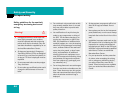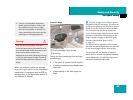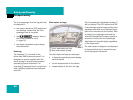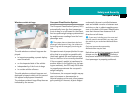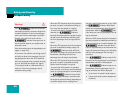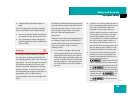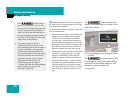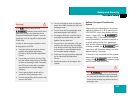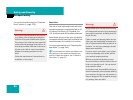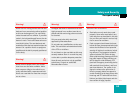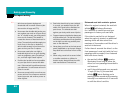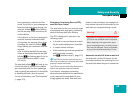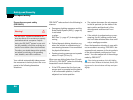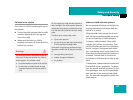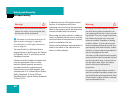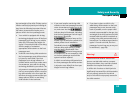
52
Safety and Security
Occupant safety
For more information, see the “Practical
hints” section (
୴ page 578).
Seat belts
The use of seat belts and infant and child
restraint systems is required by law in all
50 states, the District of Columbia, the
U.S. territories and all Canadian provinces.
Even where this is not the case, all vehicle
occupants should have their seat belts fas-
tened whenever the vehicle is in motion.
For more information, see “Fastening the
seat belts” (
୴ page 360).
Warning! G
Never place anything between seat cushion
(e.g. pillow), since it reduces the effective-
ness of the Occupant Classification System.
The bottom of the child seat must make full
contact with the passenger seat cushion. An
incorrectly mounted child seat could cause
injuries to the child in case of an accident,
instead of increasing protection for the
child.
Follow the manufacturer’s instructions for
installation of child seats.
i
For information on infants and children trav-
eling with you in the vehicle and restraint sys-
tems for infants and children, see “Children in
the vehicle” (
୴ page 57).
Warning! G
Always fasten your seat belt before driving
off. Always make sure all of your passengers
are properly restrained, including those sit-
ting in the rear.
Failure to wear and properly fasten and po-
sition your seat belt greatly increases your
risk of injuries and their likely severity in an
accident. You and your passengers should
always wear seat belts.
If you are ever in an accident, your injuries
can be considerably more severe without
your seat belt properly buckled.
Without your seat belt buckled, you are
much more likely to hit the interior of the ve-
hicle or be ejected from it. You can be seri-
ously injured or killed.
In the same crash, the possibility of injury or
death is lessened if you are properly wearing
your seat belt. Air bags can only protect as
they are designed if the occupants are prop-
erly wearing their seat belts.



